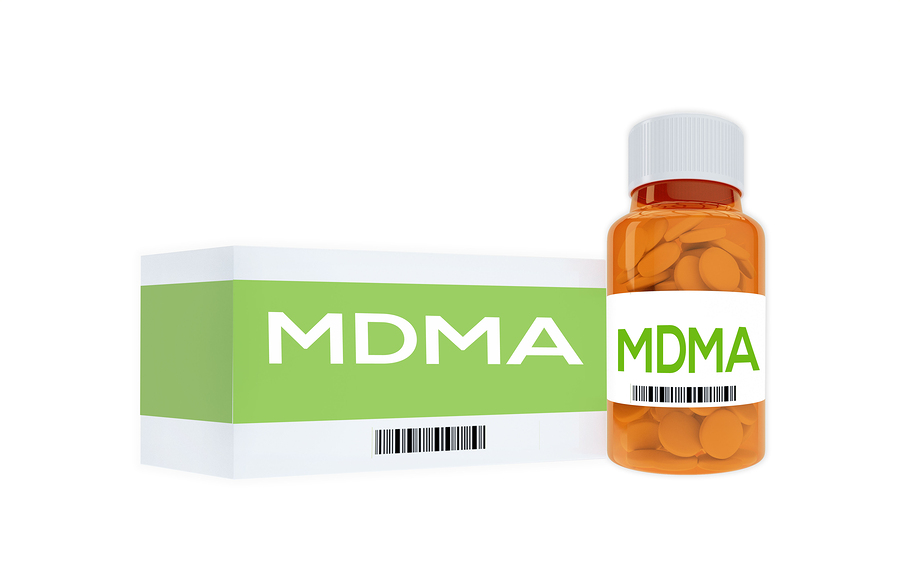 In a throwback to the hallucinogenic, mind-altering, drug-infused days of the ‘60s, the U.S. and Canada are very close to seeing a psychedelic drug approved for use in treating some mental health disorders.
In a throwback to the hallucinogenic, mind-altering, drug-infused days of the ‘60s, the U.S. and Canada are very close to seeing a psychedelic drug approved for use in treating some mental health disorders.
If the third round of test studies into the safety of using MDMA in controlled medical settings to assist in the treatment of Post-Traumatic Stress Disorder (PTSD) is successful, researchers hope the drug will be approved for psychotherapeutic use within three years--by 2021.
Illegal in most countries, MDMA is a drug recognized more commonly as the party drug Ecstasy and is known to have psychedelic, euphoric, and stimulating effects. In addition to being addictive, it can also cause a multitude of negative side effects including vomiting, headaches, and an increased heart rate.
In her recent article for Britain’s International Business Times, writer Kashmira Gander wrote that with this “latest chapter” of clinical trials scheduled to take place in Vancouver, Canada, the potential for treatment “has been dubbed the ‘psychedelic renaissance’”. She quoted Canada’s CTV News which reported that the third phase “will involve 150 participants and cost $26 million".
Writer Geordon Omand of The Canadian Press explained in his CTV News article that “Vancouver is one of 16 locations in the United States, Canada, and Israel where clinicians hope to demonstrate that a drug historically associated with gurus and raves can revolutionize psychotherapy and trauma treatment”.
Omand quoted one participant’s results after being treated in an earlier trial phase with MDMA. Ed Thompson was suffering from severe PTSD as a result of his twin daughters’ medical issues and his own trauma from years of working as a firefighter. The experiences sent “him into a spiral of post-traumatic stress, substance abuse and thoughts of suicide”, wrote Omand.
In 2015, Thomson joined a psychotherapy study treating patients who were suffering from severe PTSD with “clinical-grade MDMA”. Of the results, Omand wrote: “Thompson said the experience saved his life and kept his family together”.
According to Gander’s article, the Multidisciplinary Association for Psychedelic Studies (Maps), a non-profit research and educational organization founded in 1986, studies the benefits of psychedelic drugs and is the organization overseeing the clinical trials.
Gander referred to University of British Columbia (UBC) public health professor Mark Haden who established the Maps Canadian branch. "We hope to prove that MDMA-assisted psychotherapy is the most effective treatment for PTSD that exists on the planet," Haden declared to CTV News.
While conventional treatments of PTSD focus on “desensitization to the triggers,” Haden explained, progress can be slow and, with “just a 10 to 15 percent chance of success,” long-term results have been disappointing. “In contrast, MDMA-assisted therapy can take four months or less, with two-thirds of participants reporting no symptoms after a year, according to a preliminary study,” he said.
According to Gander, initial trial therapies proved to be incredibly successful, enough to cause the U.S. Food and Drug Administration (FDA) to grant MDMA designation “as a breakthrough therapy for PTSD in August 2017, giving researchers greater powers to investigate the drug further”.
In its advertisement for a sold-out launch party and benefit for MDMA therapy research, being hosted in Fort Collins, CO, Maps described the importance of the Phase 3 trials and their need for “more clinical sites, more therapists, more patients, and more support”. Achieving approval of governments for “MDMA-assisted psychotherapy as a legal treatment . . . would radically shift policy and public perception surrounding psychedelics”.
In addition to Maps, numerous scientists and academic professionals are studying how other drugs with “psychoactive substances” can make the leap into more traditional healthcare streams. Psychoactive substances can cross the “blood-brain barrier”, affect the central nervous system, and affect change in moods, perception, and behaviors.
Gander explained that the current “resurgence in research in the past half a decade” is the psychedelic renaissance. Studies have shown “LSD, MDMA, magic mushrooms, ayahuasca, and peyote ibogaine have beneficial properties when used in a controlled medical environment”. These findings are a stark contrast to the pervasive, limited vision of these illegal drugs in the 1950s and ‘60s “and the subsequent banning of hallucinogens in the U.S.,” she wrote.
Although researchers do not support the use of these “party drugs . . . outside of a controlled laboratory environment”, they do believe conditions like PTSD, depression, addiction, and cluster headaches may be treatable with controlled clinical use, Gander added.
“Experts are still trying to understand exactly what psychoactive substances do to the brain and the mind,” Gander wrote, citing research done at the University of Cambridge. “It is believed that psychedelics boost communication between parts of the brain that generally have little connection, and lower the activity in areas that do.”
Writing an article for science website MassiveSci.com, Johns Hopkins University neuroscientist Benjamin Bell questioned whether the psychedelic renaissance would survive this time. He wrote that “psychedelics have embodied the highest highs and the lowest lows of the American consciousness”.
Referring to the latest clinical trials on MDMA and the possible FDA approval, Bell said research is indeed raising hopes that “psychedelics may yet revolutionize mental health care”. The difficulty he foresees “is convincing an anti-drug society to accept such a radical new viewpoint, and to do so with evidence, ethics, and scientific backing”. This said Bell, “will take work for scientists and citizens alike”.
References
Bell, B., (October 9, 2017). MassiveSci.com. The psychedelic renaissance is here. Will it last this time? https://massivesci.com/articles/psychedelic-research-renaissance-culture/
Gander, K., (January 22, 2018). International Business Times. The psychedelic renaissance: Can Ecstasy really be used to treat mental illness? http://www.ibtimes.co.uk/psychedelic-renaissance-can-ecstasy-really-be-used-treat-mental-illness-1656176
Omand, G., (January 21, 2018). CTV News. Vancouver kicks off final phase of MDMA-assisted psychotherapy trials. https://www.ctvnews.ca/health/vancouver-kicks-off-final-phase-of-mdma-assisted-psychotherapy-trials-1.3768935